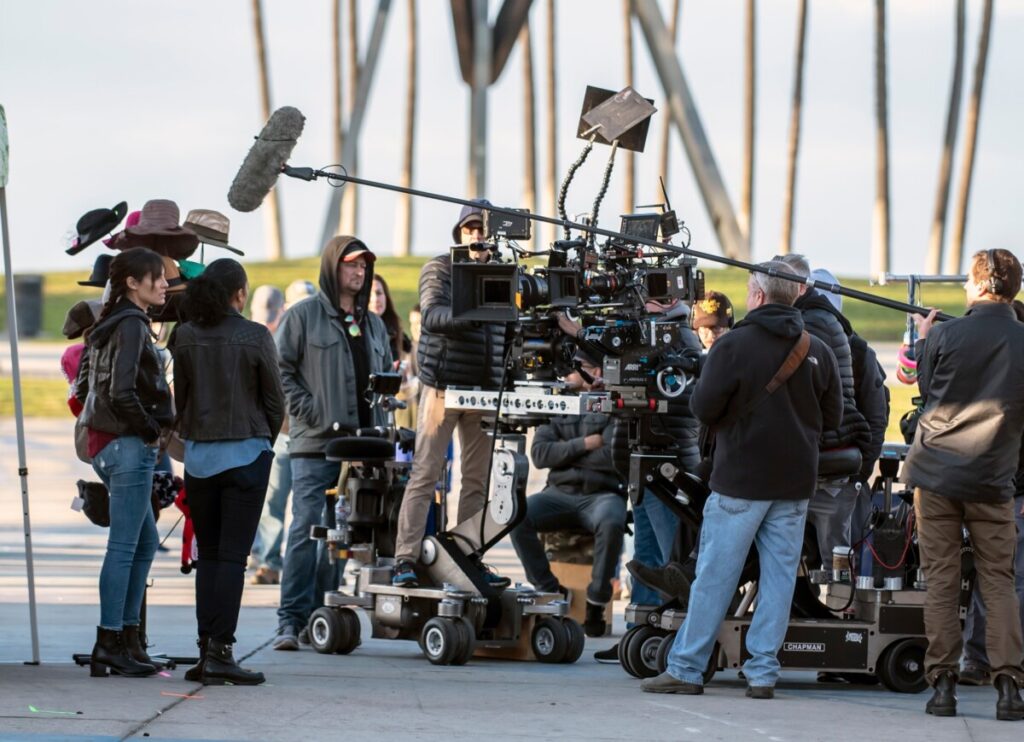June 2, 2025
The UK screen industry has experienced significant highs and lows in recent years – from record-breaking production levels to unexpected pauses and uncertainty. Whilst the sector has yet to fully return to a stable and consistent rhythm, one thing remains clear: the demand for skilled, work-ready crew is as urgent as ever. As we look ahead and remain hopeful for growth across the sector, a concerning trend is emerging among productions currently crewing up: a slide back into closed, informal recruitment practices.
At Filming in England, we believe it doesn’t have to be this way. We want to encourage the industry to embrace open, transparent, and inclusive hiring – and we’re here to help make that happen.
The Problem: Convenience Compromises Inclusion
From WhatsApp groups to word-of-mouth referrals, informal recruitment has long been embedded in the screen industry. And, truth be told, it isn’t all bad. For many freelancers – particularly in the face of recent slowdowns and ongoing production challenges – word of mouth and quick turnaround messages via WhatsApp or LinkedIn can be a lifeline. These informal channels offer quick access to job opportunities and allow productions to crew up quickly when time is tight. They can also help foster a sense of community and trust, giving crew the chance to suggest and recommend their friends and colleagues for suitable positions.
But whilst these networks can be efficient in the short term, it’s simply not sustainable – or inclusive – in the long term. They risk reinforcing exclusion – particularly for those from underrepresented backgrounds, new entrants, or those without existing industry connections. Used in isolation, informal hiring reinforces closed networks, shuts out skilled crew, and makes it harder for our industry to grow and diversify. Not only that, but it also makes it difficult to assess whether hiring practices are fair or aligned with industry standards.

In Parliament, the Department for Culture, Media and Sport Committee recently published its 2024/25 British Film and High-End Television report, highlighting how underrepresented crew continue to face barriers to entry due to ‘industry-wide informal employment practices.’ The report called for urgent change, stating:
“[…] more equitable recruitment practices are required, including expanding where roles are advertised, and committing resources to recruiting inclusively based on the skills needed for a role rather than social networks, using diverse recruitment panels.”
As competition for jobs increases and productions move at speed, we’ve seen an over-reliance on these “closed shop” methods, often at the expense of fairness, accessibility, and long-term workforce growth. These methods perpetuate inequality, and slow progress at a time when our industry is crying out for a broader range of voices. What’s more, The Film & TV Charity’s 2024 Looking Glass Report makes a powerful connection between the anxiety that comes with freelancing in the industry and the constant job-hopping that many crew members face. With mental health issues within the industry at a record high, now surpassing the national average according to the ONS, it’s clear that the pressures of uncertainty and lack of job security are taking a serious toll. The informal recruitment methods that rely on closed networks and word-of-mouth only adding to the stress, leaving workers in a constant state of insecurity.
It feels like the industry is stuck in a paradox. On the one hand, there’s real momentum: major investment is flowing into regional production infrastructure – from new studios, like the upcoming Sunderland Film Studio, to training programmes like the recently announced All Set West scheme, aimed at supporting South West creatives into careers behind-the-camera. These are fantastic efforts, all geared towards building stronger regional infrastructure and talent-base. Yet despite this progress, we’re still seeing many productions default to bringing in London based Heads of Department, limiting opportunities for local crew to step up into leadership roles. With personal connections and closed networks trumping open calls, we risk undermining the very workforce development this investment is trying to achieve.

Diversity is a stated priority across the industry – so why does it feel like recruitment is moving in the opposite direction? Joining us to unpack how closed hiring practices directly impact underrepresented crew is Sara Johnson, an ex-TV Commissioner, turned Access Consultant and Agent to Access Coordinators. Sara co-leads Casarotto Ramsay‘s Access Team with Julie Fernandez, where they represent, train and supervise Access Coordinators, so has a unique point of view of what is happening on productions of all genres from the ground up. She, Julie and their 18 ACs work closely with productions to ensure disabled talent, freelancers from marginalised backgrounds, and those facing systemic barriers can access meaningful, sustainable work in film and TV. Sara’s insight offers a crucial perspective on why open, transparent recruitment is key to building a truly inclusive industry:
“It’s clear that our hiring and onboarding processes need bespoke and continued support to make them as accessible as possible. From our experience, many productions are theoretically really happy to interrogate how they hire and open up their networks, but long hours, tight schedules and short lead times mean that good intentions often go out of the window. Our ACs always point to the existing disabled-led organisations for any job ads to be shared and suggest accessible formats (if they join a show in time), but I’m not sure how often that is carried out or indeed if the applicants are seriously considered.”
“I don’t have many answers because despite all the good work in play across the pillars of diversity, the barriers are systemic and endemic. I do believe however that the right start is easy, which is to look at existing practices and processes honestly… With an industry that over-indexes on those with non-visible disabilities/neurodivergence, we may have more diversity in our existing crews than we realise, but inclusive hiring/working practices and on-the-ground support goes hand in hand, in order for sustainable change to flourish. I am hopeful that we are making a difference, but this will be much easier when every production hires an affordable and valuable Access Coordinator no matter the genre or budget!”
When productions bypass formal recruitment processes, they’re not just missing a chance to diversify their crew – they’re missing out on talent full stop. There are skilled, passionate, and production-ready individuals out there who are being overlooked simply because they’re not in the right group chat or on someone’s personal referral list.

The Solution: Open Recruitment Pathways
To ensure the long-term sustainability of the UK’s screen workforce, productions need to start adopting transparent and inclusive recruitment strategies. That means advertising roles widely, using open platforms, and drawing from diverse talent pools – not just familiar faces.
At Filming in England, we actively support this formal and equitable approach through our National Crew Directory – a free, accessible database connecting productions with professional crew based across the English Regions (outside of London). Whether you’re looking for a Production Coordinator in Birmingham or a Gaffer in Cornwall, this is the place to start.
We understand that productions move fast – and so do we. Our Crewing Team works year-round with major players like Paramount, Warner Bros., and the BBC to help productions source the right people quickly and fairly. Through the Crew Directory and our wide regional networks, we offer hands-on support with:
- Promoting vacancies through our speedy Crew Call service
- Reaching skilled professionals across all corners of the country
- Quality checking all crew profiles and CVs for professionalism and readiness
- Offering a discretionary matchmaking service – suggesting crew based on location, skillset, and availability
In short, we’re here to help productions find people fast – without compromising on fairness, professionalism, or regional representation.
“I have used the [Filming in England] crew services over the years on most of my productions as I find it invaluable for finding trainees, regional crew and generally being able to connect outside of my regular circle. The team are always helpful and support the needs of the production whatever the region and they are always willing to help with a very personable approach.”
HETV Drama Line Producer
Of course, we’re not the only ones working to stomp out poor recruitment practices. With informal hiring a widely shared challenge across the industry, there’s a growing movement to do better. Work Wise for Screen, a BFI-funded programme, is leading the charge by equipping employers and freelancers with practical tools to foster more respectful, inclusive, and equitable workplaces, whilst actively opening opportunities to a diverse workforce. Likewise, our partners at The Kusp continue to champion under-represented creatives from ethnic minority and lower socio-economic backgrounds through their bespoke jobs board and curated networking programmes. Together with these organisations – and many others across the industry – we’re pushing for a more transparent, professional, and fair hiring culture.
Making a Case for Inclusion
Inclusive hiring isn’t just the right thing to do – it makes business sense. Productions that embrace best practice recruitment don’t just widen their talent pool – they reduce risk, strengthen workplace culture, and meet the growing expectations of funders when it comes to diversity, equity, and inclusion.
If you want your production to reflect the world we live in, your recruitment approach needs to reflect it too.
And that responsibility doesn’t fall on one person – it starts with everyone. Whether you’re a Line Producer, a Coordinator, or Studio Exec, every hiring decision matters. So before firing off a quick WhatsApp to fill a role, take a moment to ask: Have we cast the net wide enough?
By choosing open, inclusive recruitment strategies, we’re not just filling roles – we’re building a stronger, fairer screen industry where everyone can thrive and gets a fair shot.
Start by using our National Crew Directory and let’s make fair hiring the industry standard.
To find out more about Filming in England’s Crewing Service visit here
To find out more about Work Wise for Screen visit here
To find out more about The Kusp visit here
For further entry level career support, download our New Entrant Starter Pack here
For all other enquiries please visit: https://www.filminginengland.co.uk








